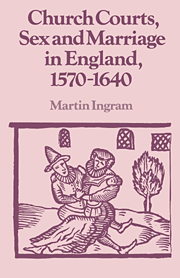Book contents
- Frontmatter
- Contents
- List of tables
- List of maps
- Preface
- Conventions and abbreviations
- Introduction
- PART 1 THE LEGAL AND SOCIAL BACKGROUND
- 1 The structure of ecclesiastical justice
- 2 Economic and social structures
- 3 Religion and the people
- 4 Sex and marriage: laws, ideals and popular practice
- PART 2 SEX AND MARRIAGE: THE PATTERN OF PROSECUTIONS
- PART 3 CHURCH COURTS AND SOCIETY
- Bibliography
- Index
- Past and Present Publications
3 - Religion and the people
Published online by Cambridge University Press: 24 September 2009
- Frontmatter
- Contents
- List of tables
- List of maps
- Preface
- Conventions and abbreviations
- Introduction
- PART 1 THE LEGAL AND SOCIAL BACKGROUND
- 1 The structure of ecclesiastical justice
- 2 Economic and social structures
- 3 Religion and the people
- 4 Sex and marriage: laws, ideals and popular practice
- PART 2 SEX AND MARRIAGE: THE PATTERN OF PROSECUTIONS
- PART 3 CHURCH COURTS AND SOCIETY
- Bibliography
- Index
- Past and Present Publications
Summary
Much of the discussion so far has stressed similarities of role between the church courts and other contemporary legal institutions. In contrast to other courts, however, the ecclesiastical tribunals were uniquely dependent on spiritual sanctions, and hence on the state of religious feeling within the country and the degree of religious uniformity. It hardly needs emphasising that in the long term the religious changes of the sixteenth and seventeenth centuries did seriously undermine the structures of ecclesiastical justice. The process of the Reformation, interrupted by the Marian reversion to Catholicism, shattered religious unity and burdened the church courts with the exceedingly difficult task of trying to maintain conformity amid the drastic and inconsistent shifts of government policy. In the reign of Charles I, Laudian policies and Calvinist reactions to them created fresh disunity; while the temporary abolition of the institutions of ecclesiastical justice in the period 1641–60, the emergence of protestant nonconformity on a substantial scale in the mid- to late seventeenth century, and ultimately the passage of the toleration act in 1689, in the long run crippled many aspects of the church courts' work. However, from the perspective of the period from the 1570s to the 1630s the picture appears very different. In these years the church of England proved remarkably successful in containing both Catholicism and protestant sectarianism and in firmly establishing the protestant state church. The main problem facing churchmen was lax religious observance, or even religious indifference, among some sections of the population; but even on this front some progress was made in raising standards, and in any case the problem was probably not as great as some historians have suggested.
- Type
- Chapter
- Information
- Church Courts, Sex and Marriage in England, 1570–1640 , pp. 84 - 124Publisher: Cambridge University PressPrint publication year: 1988

